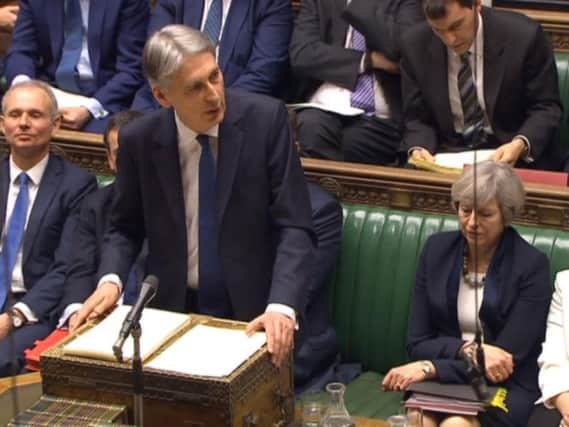Sugary drinks to be taxed up to 24p per litre, chancellor confirms in budget


Philip Hammond announced a two-tier levy of 18p on drinks with 5g of sugar per 100ml, and the higher 24p rate on those with more than 8g per 100ml.
Ministers confirmed plans late last year to push ahead with the tax on the producers and importers of soft drinks with added sugar, despite opposition from industry, which will be introduced from April 2018.
Advertisement
Hide AdAdvertisement
Hide AdResponding to the Budget announcement, British Soft Drinks Association director general Gavin Partington said: "Given current increases in the cost of goods, we're surprised the Treasury wishes to put more pressure on businesses and raise prices for hard-pressed consumers.
"It's also ironic that the tax hits the soft drinks category, which has led the way in helping consumers reduce sugar intake - down nearly 18% since 2012. We are also the only sector with a calorie reduction target for 2020.
"We support the need to address the public health challenge the country faces, but it's worth bearing in mind that there is no evidence taxing a single product or ingredient has reduced levels of obesity anywhere in the world."
However the Obesity Health Alliance described the levy as a "bold, positive and necessary move we believe will help reduce the amount of sugar our children consume".
Advertisement
Hide AdAdvertisement
Hide AdA spokeswoman said: "There is evidence from other countries that show similar taxes have helped to reduce the amount of sugary soft drinks consumed.
"We've already seen a number of companies in the UK announce plans to reduce sugar content in their products, so clearly the potential impact is huge.
"This is a significant step in the battle against obesity and the Government should be applauded for its commitment to seeing it through."
Pure fruit juices will be exempt from the levy as they do not carry added sugar, while drinks with a high milk content will also be exempt because of their calcium content.
Advertisement
Hide AdAdvertisement
Hide AdAlcoholic drinks with an alcohol by volume of up to 1.2% (ABV) are included in the levy, although some of these drinks will be exempt.
The tax is expected to net £520 million in 2018/19, with a further £500 million in 2019/20 and £455 million in 2020/21.
The Department for Education is expected to receive an extra £1 billion from the sugar tax for school sports.
However, Mr Hammond added that revenues could be lower than expected as companies reduce the amount of sugar in their products to avoid the tax.
Advertisement
Hide AdAdvertisement
Hide AdThe Royal Society for Public Health (RSPH) chief executive, Shirley Cramer, said: "We are delighted that, as shown by the downgrading of the Treasury's revenue expectations, the sugar levy is already working to spur reformulation of sugary drinks by manufacturers.
"This is a crucial development for the health of our children, who receive the highest proportion of their added sugar intake from such drinks.
"We are doubly delighted that, despite the reduction of forecast revenue from the levy, the Government has maintained its commitment to the full funding already promised to schools for sports and healthy living programmes.
"Schools have an important role to play in giving all our children a healthy and active start in life, and it is encouraging to see the Government giving them this backing."
Advertisement
Hide AdAdvertisement
Hide AdAction on Sugar campaign manager Jenny Rosborough said: "We are fully supportive of the sugar tax levy and the commitments we've already seen from a growing number of drink manufacturers who've started to reduce sugar to less than 5% across popular brands.
"Sugar-sweetened drinks are the biggest contributor of sugar in the diets of children and teenagers and unless they are reduced these drinks will still contribute to the high levels of obesity, type 2 diabetes and tooth decay, all of which are preventable and cost the NHS billions of pounds each year.
"We now strongly urge all manufacturers to reformulate and avoid the levy."